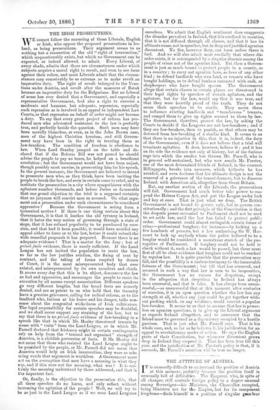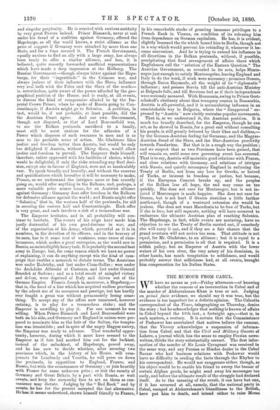THE ATTITUDE OF AUSTRIA.
IT is unusually difficult to understand the position of Austria at this moment, probably because the position itself is unusually full of difficulties. The Emperor, who, in spite of all changes, still controls foreign policy to a degree unusual among Sovereigns—his Ministers, the Chancellor. excepted, being Ministers not for the Empire, but for its component kingdoms—finds himself in a position of singular gsanieur
and singular perplexity. He is courted with anxious assiduity by very great Powers indeed. Prince Bismarck, never at rest under his dread of a coalition against Germany, offered the Hapsburgs, as all the world knows, a strict alliance as the price of support if Germany were attacked by more than one State, and for a time secured it. The French Government, equally anxious to find an ally with a large army, has always been ready to offer a similar alliance, and has, it is believed, quite recently forwarded unofficial representations which have made a deep impression at the Hofburg. The Russian Government—though always bitter against the Haps- burgs, for their " ingratitude " in the Crimean war, and always jealous of their influence with the Slays, influence very real both with the Poles and the Slays of the south— is, nevertheless, quite aware of the power afforded by the geo- graphical position of the House, and is ready, at all events, to discuss the kind of compromise alluded to by the Im- perial Crown Prince, when he spoke of Russia going to Con- stantinople, if Austria might go to Salonica. A partition, in fact, would be, if not probable at least possible, did the the Austrian Court agree. And our own Government, though not disposed, as that of Lord Beaconsfield was, to see the Balkan peninsula sacrificed to a family, must still be most anxious for the adhesion of a Power which disposes of such resources in men and is so near to the probable scene of action. Mr. Gladstone likes justice and freedom better than Austria, but would be only too delighted if Austria, without liking them, would allow justice and fteedosa to prevail. The Emperor finds himself, therefore, rather oppressed with his facilities of choice, which would be delightful, if only the risks attending any final deci- sion, except one in favour of England, were not so incalculably vast. To speak broadly and brutally, and without the reserves and qualifications which hereafter it will be necessary to make, France, as we understand the intrigues more or less secretly going on, would offer anything in the Balkans, and, perhaps, a more valuable prize nearer home, for an Austrian alliance against Germany ; Germany does offer freedom in the Balkans for defensive alliance against the world ; and Russia might offer "Salonica," that is, the western half of the peninsula, for aid in securing the eastern half and Constantinople. Each offer is very great, and each involves a risk of a tremendous war.
The Emperor hesitates, and in all probability will con- tinue to hesitate. The events of his reign have made him justly distrustful of his own good-fortune in war, and of the organisation of his Army, which, powerful as it is in numbers, in the devotion of its officers, and in the bravery of its men, has in it some root of weakness, some cause of cum- brousness, which makes a great enterprise, as the world saw in Bosnia, an unintelligibly heavy task. It is probably the second best army in Europe, but, for some reason which we have no power of explaining, it can do anything except win the kind of cam- paign that enables a monarch to dictate terms. The Austrians won under Radetsky, and lost under Clam-Gallas ; won under the Archduke Albrecht at Custozza, and lost under General Benedek at Sadowa ; and as a total result of mingled victory and defeat, were deprived of Italy and driven out of the German Empire. Francis Joseph is, moreover, a Hapsburg,— that is, the head of a line which has acquired endless provinces by the adroit use of its resources and prestige, but has hardly ever fought a great war without permanently losing some- thing. To accept any of the offers now rumoured, however enticing, is to play for a tremendous stake ; and the Emperor is unwilling to play it. For one moment he was willing. When Prince Bismarck and Lord Beaconsfield were both on his side, and Germany and England in unison were pre- pared to nominate him as the heir of the Sultan the tempta- tion was irresistible ; and in spite of the angry Magyar outcry, the -Emperor was ready to advance. That wonderful oppor- tunity, however, during which it must have seemed to the Emperor as if fate had marked him out for the luckiest, instead of the unluckiest, of Hapsburgs, passed away, and he has now to decide whether, after securing two provinces which, in the history of his House, will com- pensate for Lombardy and Venetia, he will press on down the peninsula, in opposition to England, France, and Russia, but with the countenance of Germany ; or join heartily with France for some unknown prize ; or risk the enmity of Germany and Great Britain by a pact with Russia, or wait events, and keep the monarchy free to act on them as con- venience may 'dictate. Judging by the "Red Book" and by events, he has for the present accepted the last alternative. Ho'has,it seems understood, shown himself friendly to France,-
in his remarkable stroke of granting immense privileges to a French Bank in Vienna, on condition of its releasing him from dependence on German capitalists. He has, it is evident, slightly loosened the tie which bound him to Berlin, though not in a way which would prevent his rebinding it, whenever it be- came convenient. And he is trying to extend his influence in all directions in the Balkan peninsula, without, if possible, precipitating that final arrangement of affairs there which Englishmen call the "solution of the Eastern Question." The Austrian Government, as revealed in its acts, helps Monte- negro just enough to satisfy Montenegrins, leaving England and Italy to do the work, if work were necessary ; promises Greece, through Baron Haymerle, all the weight of its " diplomatic " influence ; and presses Servia till the anti-Austrian Ministry at Belgrade falls, and till Servians feel as if their independence were seriously menaced. With Roumania, owing to Prince Gort- schakoff's obstinacy about that trumpery cession in Bessarabia, Austria is all-powerful, and it is accumulating influence in an unmistakable way in Bulgaria, where the " disapproval " ex- pressed by "Austria" now visibly restrains popular movements.
That is, as we understand it, the Austrian position. It is much too broadly described, for the Emperor, though he can act, as he showed in Bosnia, for a great end without consulting his people, is still greatly fettered by their likes and dislikes,— by the German-Austrian feeling for Germany, and the Magyar. Austrian dread of the Slays, and the Slav-Austrian proclivity towards Panslavism. But that is in a rough way the position ; and we suspect that as two Provinces have been gained, that will remain so, until some new governing event has occurred. That is to say, Austria will maintain good relations with France, and close relations with Germany, and relations of intrigue with Russia, and quietly accompany England in enforcing the Treaty of Berlin, not from any love for Greeks, or hatred of Turks, or interest in freedom or justice, but because, if the European Concert breaks up, and the peoples of the Balkan lose all hope, the end may come on too quickly. She does not care for Montenegro, but is not in- jured if Montenegro is made happier. She does not care for Greece, but is not hurt if Greece stretches a little further northward, though of a westward extension she would be jealous. She does not want Macedonia to be free of Turks, but if she is free, but still separate, nothing will have occurred to embarrass the ultimate Austrian plan of reaching Salonica. The .Hapsburgs, in fact, while events are maturing, have no objection to see the Treaty of Berlin carried out, if somebody else will carry it out, and if they see a fair chance that the grand overturn will not arrive too soon. That attitude is not equal, for Mr. Gladstone, to an alliance ; but it is equal to a permission, and a permission is all that is required. It is a selfish policy, but an Emperor of Austria with the lower waters of his own river, the very artery of his dominion, in other hands, has much temptation to selfishness, and would probably answer that selfishness had, at all events, brought him compensation for his Italian States.







































 Previous page
Previous page